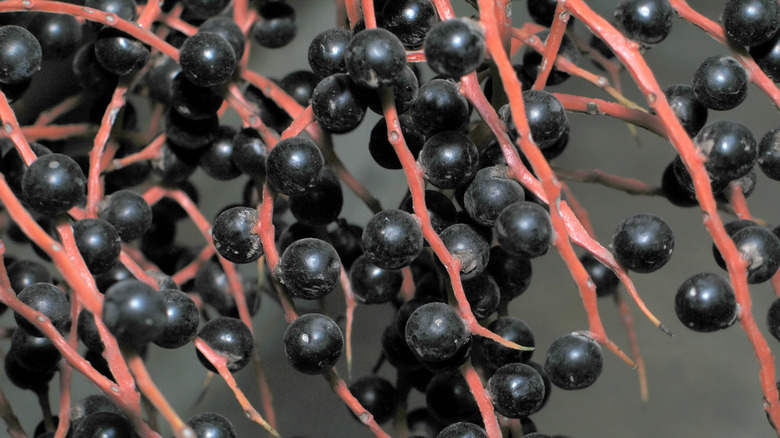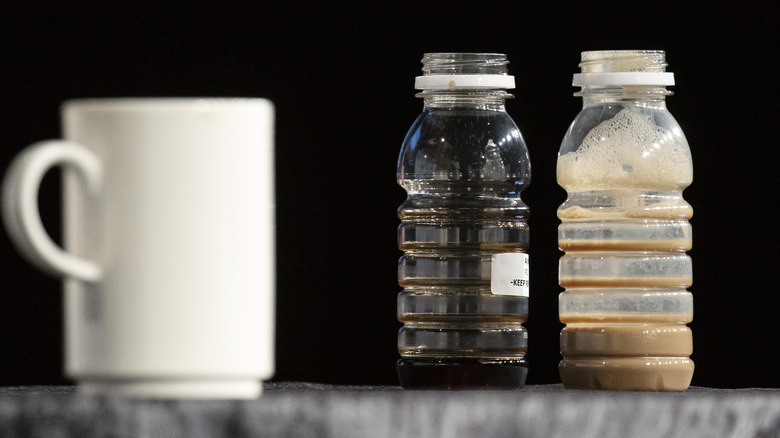Why Bean-Free Coffee Could Be The Way Of The Future
In 1869, Sri Lanka, an island country south of India, was hit by the first-recorded epidemic of coffee rust that put the Sri Lankan coffee empire to its end within just 20 years. The disease spread by wind, and in the following decades reached every coffee-producing country in the world. The fungus has no cure, and rising temperatures continue to fuel waves of outbreaks around the world, particularly in Latin America – a region that is home to half of the world's top 10 coffee producers (via IADB).
This century, global temperatures are projected to increase from two to nearly 10 degrees Fahrenheit (via NOAA Climate). As rising temperatures help the coffee rust spread, experts also say they will bring extreme periods of droughts and floods that will make farming the crop even more difficult. It's been estimated that, by 2050, as much as 50% of the regions that currently produce the world's coffee will not be able to support the crop's growth (via IADB).
As coffee farming gets more challenging and the climate to support it dissipates, the plant's demand is only expanding. Currently, 2.25 billion cups of coffee are drank every single day (via NOAA Climate), not to mention the roughly 120 million people who rely on it economically (via Stacker). That's a lot of potentially empty mugs and lost jobs in the case that the coffee agricultural industry doesn't find a way to adapt — and fast.
Hybrid plants aren't the answer
Despite there being more than 120 different coffee species, as much as 80% of the coffee produced today is Arabica (via IADB). While the industry has shifted its focus towards developing new hybrid coffee plants that are resistant to disease, rising temperatures, and sun exposure, some scientists have warned that they are not the long-term solution. One of the world's leading coffee geneticists, Benoît Bertrand, told NPR that, whether it's "in five years, in one year, in 10 years," coffee rust will only evolve to overtake resistant genes.
Hybrid plants also neglect to address coffee agriculture's own role in the climate crisis. As detailed by Ohio State University's Environmental Sciencebites, the global coffee agricultural industry is not only guilty of mono-cropping, which erodes soil and pollutes water, but has also clear-cut areas of what was once lush rainforest for their own use. As you might expect, tearing down the rainforest only exacerbates the climate crisis (via World Wildlife Fund), and fuels the problems that the industry is already facing.
The bean-less solution
One Seattle startup, Atomo, has found a long-term solution that ditches the coffee bean entirely. But to do this, they had to reverse-engineer it by breaking coffee down into a thousand molecular compounds that were then differentiated by what they saw as the drink's five main components: aroma, body, color, taste, and caffeine (via Upcycled Foods). However, CEO and co-founder, Andy Kleitsch, knew that their vision wouldn't succeed if it wasn't also sustainable. With that, they turned to upcycling.
After identifying what types of plants could produce the same five components they found in coffee, Atomo partnered with farmers to utilize plant waste and recreated a molecular formula for coffee out of unused parts of plants like sunflowers and watermelons. Through a patented process, the plant compounds were upcycled and converted into the same ones identified in coffee beans. They're then roasted, ground, and brewed like any cup of coffee would be (via Upcycled Foods) — minus 93% of the carbon footprint (via Food Business News).
Currently, consumers can pre-order cans of Atomo's molecular cold brew in classic black, ultra smooth, and oat-latte blends directly from their website. However, if you're questioning the taste of molecular coffee, rest assured. Panelists in a blind study conducted by National Food Labs had no idea the coffee was bean-less, and Atomo actually outranked other competitive conventional cold brews on preference 2:1 (via Food Business News).


